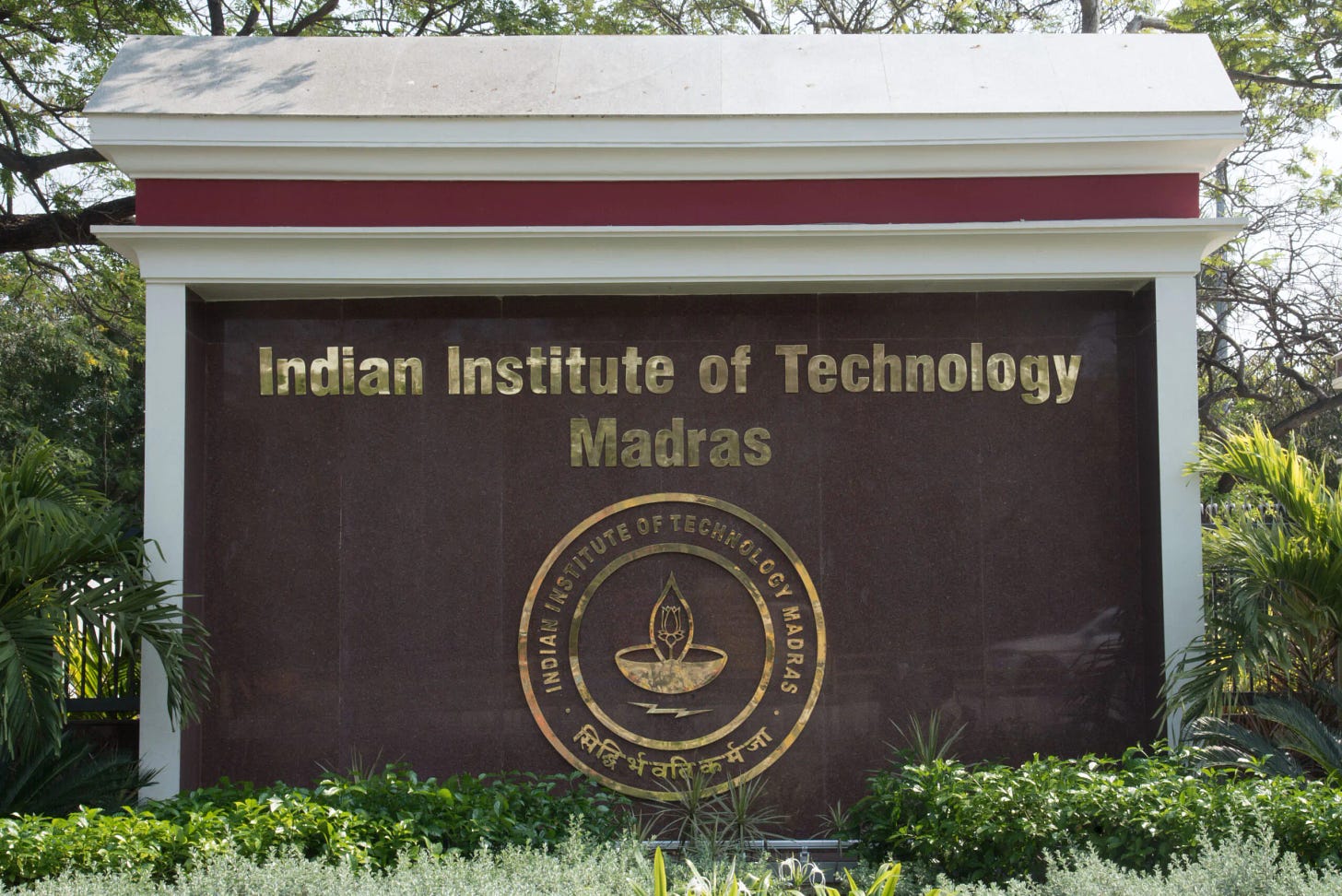India’s AI Surge: Leading Adoption, Next-Gen AI Models, and Ethical Governance
The AI4India Weekly #26
India is rapidly emerging as a global powerhouse in AI, driving adoption, innovation, and ethical governance in ways that are reshaping the technology landscape. This week’s edition of The AI4India Weekly focuses on key developments reflecting this progress: from a BCG report underscoring India's leadership in AI adoption to Google DeepMind’s groundbreaking advances in model efficiency and IIT Madras’s call for inclusive AI governance. With these efforts, India is setting standards not only in technological prowess but also in creating a responsible, inclusive AI ecosystem. Read on to understand how these initiatives are placing India at the forefront of the global AI movement.
India Leads the Global AI Adoption Curve, Outpacing World Average
India is emerging as a frontrunner in AI adoption, with 30% of organizations actively integrating AI solutions, as revealed in a recent Boston Consulting Group (BCG) report. This adoption rate places India significantly ahead of the global average of 26%, highlighting the country's progressive stance towards AI as a key enabler of growth across sectors. Fueled by robust government support, increasing digital literacy, and a thriving startup ecosystem, AI is becoming a central component of operational and strategic frameworks within India’s healthcare, finance, manufacturing, and retail sectors. Companies in these industries are utilizing AI to streamline workflows, enhance customer experiences, and drive greater operational efficiencies.
This high rate of AI adoption not only demonstrates India’s readiness to embrace emerging technologies but also underscores the country's commitment to fostering an innovation-driven economy. By prioritizing AI investments, Indian organizations are preparing to compete on a global scale, leveraging AI to automate complex tasks, optimize resources, and deliver data-driven insights that empower better decision-making. As more enterprises adopt AI, they contribute to a robust foundation for India’s digital economy, positioning the nation as a global AI leader poised to influence international standards and best practices in technology and innovation.
Groundbreaking Ruling in GenAI Case May Set Legal Precedent for AI Usage
A significant ruling in the U.S. District Court for the Southern District of New York (SDNY) could have major implications for generative AI (GenAI) developers and users. Judge Colleen McMahon recently dismissed the case of Raw Story Media Inc. v. OpenAI Inc., a lawsuit alleging copyright infringement in content produced by OpenAI’s generative models. The dismissal, although "without prejudice," offers a pivotal moment for GenAI defendants in the district and could establish precedents for similar cases across jurisdictions. The decision suggests that courts may be inclined to dismiss such cases at an early stage, questioning the grounds for copyright claims against AI-generated content.
This ruling marks a potentially seismic shift in how intellectual property laws apply to AI-generated works, paving the way for a clearer legal landscape for AI innovators and users. For the GenAI community, this decision may reduce some uncertainties surrounding the use and distribution of AI-generated content, potentially encouraging further investment and adoption. While the dismissal without prejudice means that plaintiffs could refile the case, it represents a cautiously optimistic step toward addressing the complex legal considerations of GenAI. If upheld in future rulings, this could set a legal benchmark, influencing how courts worldwide approach similar issues.
Beyond GenAI: India’s Push Towards the Next Frontier in AI Innovation
As global focus on Generative AI (GenAI) continues, a new class of AI technology is quietly taking shape in India, setting the stage for transformative advancements beyond GenAI’s capabilities. Researchers and technologists in India are working on next-generation AI models that aim to combine the creativity of GenAI with enhanced reasoning and cognitive understanding. Unlike current GenAI systems, which excel in generating human-like text or images, these new AI systems are designed to perform tasks that require contextual understanding, decision-making, and autonomous learning. This shift represents a profound leap towards AI systems that can interpret complex scenarios, solve problems in real-time, and potentially act with a level of human-like intelligence.
India’s role in pioneering this new AI frontier is supported by its robust research ecosystem and government backing for emerging technology projects. With initiatives from top institutions and AI research hubs in cities like Bengaluru and Hyderabad, Indian innovators are pushing the boundaries to develop AI systems that could benefit sectors such as healthcare, agriculture, and public safety. These efforts are aligned with India's broader goals of fostering a tech-driven economy, positioning the country not just as a user of GenAI but as a global leader in advanced AI innovation. As these new AI models evolve, they hold the potential to redefine global standards, enabling smarter, more intuitive AI solutions that could fundamentally reshape industries worldwide.
Towards Inclusive AI Governance: IIT Madras Advocates for a Participatory Model
A recent study by the Indian Institute of Technology Madras (IIT Madras) emphasizes the need for a participatory approach to AI governance in India, highlighting how inclusive policy frameworks could better address the ethical, social, and economic challenges posed by artificial intelligence. According to the study, involving a diverse range of stakeholders—including government bodies, industry experts, academia, and civil society—in AI governance is essential for developing transparent, fair, and accountable systems. This collaborative approach is envisioned to ensure that AI policies are well-rounded and that the technology is used responsibly, benefiting society as a whole
The IIT Madras study also points out that an inclusive governance model could enhance public trust in AI by increasing transparency and aligning AI development with societal needs. The researchers suggest that such a model would help identify and mitigate biases in AI systems, promote ethical use, and enable adaptive regulations to keep up with rapid advancements in AI technology. As India continues its rapid adoption of AI, this call for participatory governance offers a timely and essential framework, positioning the nation to lead by example in creating a socially responsible AI ecosystem.
Google DeepMind’s RRTs: Revolutionizing AI with Massive Model Efficiency
Google DeepMind has unveiled a new AI model architecture called Recursive Reasoning Transformers (RRTs), poised to reshape the AI landscape by making smaller models obsolete in certain applications. RRTs are engineered to tackle complex reasoning tasks with unprecedented efficiency, enabling large AI models to operate with greater accuracy and scalability. This breakthrough signifies a shift in focus from model size to reasoning capability, demonstrating that advanced AI solutions no longer require compromises in performance when scaled down.
The introduction of RRTs holds significant implications for AI development, including resource-efficient applications that can handle sophisticated reasoning tasks with fewer computational demands. This architecture could dramatically reduce costs and improve access to advanced AI capabilities, especially in resource-constrained environments or industries that rely on real-time, decision-making AI. As AI adoption grows in India, RRTs present a promising solution for scalable, high-performance AI that could accelerate the country's tech innovation while aligning with sustainability goals.
In The News
1. Google and MeitY Unveil AI Academy India 2024 for Startups - Google and the Ministry of Electronics and Information Technology (MeitY) launch the AI Academy India 2024, aimed at empowering emerging startups with cutting-edge AI skills and resources. Read More
2. Collaborative AI Research Lab Opens at Hyderabad’s T-Hub - A new foundation dedicated to collaborative AI research is launched in Hyderabad’s T-Hub, marking a step forward for AI innovation and cross-industry partnerships in India. Read More
3. IndiaAI Hosts Expert Webinars on CyberGuard AI Hackathon - IndiaAI initiates CyberGuard webinars, offering insights and guidance on the CyberGuard AI Hackathon to strengthen cybersecurity and AI knowledge across sectors. Read More
4. Rabbitt AI Introduces GenAI for Strategic Defense Applications - Rabbitt AI announces its focus on defense with the strategic use of generative AI, signaling advancements in national security technology. Read More
5. STT GDC Expands with AI-Driven Data Centers in Navi Mumbai - STT GDC grows its presence in India by launching new AI-powered data centers in Navi Mumbai, aimed at boosting data storage and processing capabilities. Read More
6. IIM Calcutta Program Equips Executives for AI-Driven Leadership - IIM Calcutta launches an advanced program tailored to prepare senior executives for the evolving challenges of AI-empowered business leadership. Read More
#DataDaan - Donate for a Digital India
Aligned with the IndiaAI mission and the efforts from MeitY to ensure the availability of AI-usable data across govt, the #DataDaan campaign by AI4India.org is inviting participation from individuals and organizations to contribute valuable data for AI development in India. This initiative aims to gather diverse datasets to enrich the national data repository, supporting innovation across various sectors. We encourage everyone to read the detailed white paper on the campaign - https://bit.ly/DataDaan and fill out the form - http://bit.ly/3XfxD3H to contribute to this transformative effort.
We’ve also created a podcast on #DataDaan using Google’s NotebookLM, which transforms documents into engaging audio conversation. Listen to the podcast below!
This concerted push to make AI work for India highlights how data accessibility can unlock the potential for large-scale socio-economic transformation, driving innovation, and ensuring India’s competitive edge in the AI-driven global economy.
NOTE: The views expressed by the authors are their own. AI4India as a forum does not endorse any comments on specific brands, products, platforms or companies.
Join our AI4India.org forum to be a part of the AI revolution in India by visiting our site now.
Follow us on our X and LinkedIn to receive interesting updates and analysis of AI-related news











